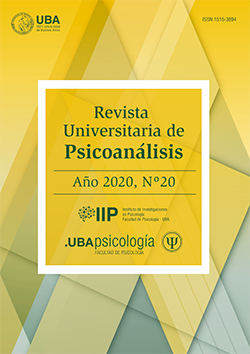Revista Universitaria de Psicoanálisis - Volumen XX

La angustia que no engaña y la que engaña
The anguish that does not deceive and the one that does
Autor/es: Por David Andrés Vargas Castro
Universidad de Buenos Aires (UBA). Facultad de Psicología. Magíster en Psicoanálisis y Doctorando en Psicología. UBA.
Universidad de Buenos Aires (UBA). Facultad de Psicología. Cátedra de Clínica de Adultos. Docente e Investigador. Facultad de Psicología UBA
Universidad de La Marina Mercante (UdeMM) Técnicas de Abordaje e intervención en crisis, Docente e Investigador UdeMM.
Miembro del Foro Analítico del Río de la Plata (FARP)
Autor de diversos artículos científicos. Buenos Aires, Argentina.
E-mail: vargascastrod@yahoo.com.ar
RESUMEN
El presente texto tiene como propósito interrogar la afirmación lacaniana de la angustia como afecto que no engaña. Para tal propósito, iniciaremos revisando las últimas elaboraciones freudianas sobre la angustia localizables en el texto “Inhibición, síntoma y angustia”, para luego ubicar en el seminario La angustia ciertas coordenadas allí desarrolladas por Lacan, como es la de la angustia como señal de lo real, su relación al objeto a, al falo y al fantasma; así como la propuesta de fin de análisis más allá de la angustia de castración. Posteriormente, propondremos que en Lacan podemos ubicar dos modos de presentarse la angustia: una, que engaña, en su articulación al fantasma y a la angustia de castración; otra, que no engaña, en consonancia con el significante de la falta en el Otro en términos de desamparo. Finalmente, ubicamos algunas consecuencias para la práctica analítica, al denotar la articulación del deseo del analista con la angustia vía el acto, y señalando que no distinguir en el análisis las dos manifestaciones de la angustia previamente denotadas, resulta engañoso para el analista al confundir la detención del análisis con su finalización.
Palabras clave:
Angustia señal, Angustia traumática, Fantasma, Castración, Desamparo
SUMMARY
The purpose of this text is to interrogate the Lacanian affirmation of anguish as an affect that does not deceive. For this purpose, we will begin by reviewing the latest Freudian elaborations on anguish that can be found in the text “Inhibition, Symptom and Anguish”, and then locate in the Seminar The anguish certain coordinates developed there by Lacan, such as that of anguish as a sign of what it is real, its relation to object a, phallus and phantasy; as well as the proposal for the end of the analysis beyond castration’s anguish. Later, we will propose that in Lacan we can locate two ways of presenting anguish: first one, which deceives in its articulation the phantasy and the anguish of castration; another one, which does not deceive in relation with the signifier of the lack in the Other in terms of helplessness. Finally, we locate some consequences for analytical practice by denoting the articulation of the analyst´s desire with anguish by the means of the act, and pointing out that not distinguishing in the analysis the two previously denoted manifestations of anguish, is misleading for the analyst by confusing the stop of the analysis with its completion.
Keywords:
Signal anguish, Traumatic anguish, Phantasy, Castration, Helplessness
Opción de descarga del trabajo completo en .pdf
Secretaría e Instituto de Investigaciones
Lavalle 2353
Tel/fax:4952 – 5481/ 4952 – 5490
Horario de atención: 10 a 17 hs
E-mail:
instinve@psi.uba.ar


